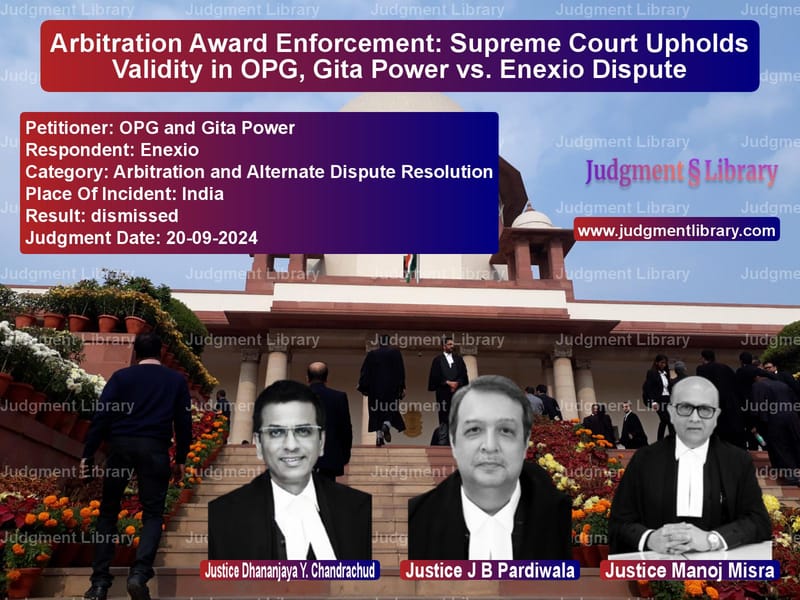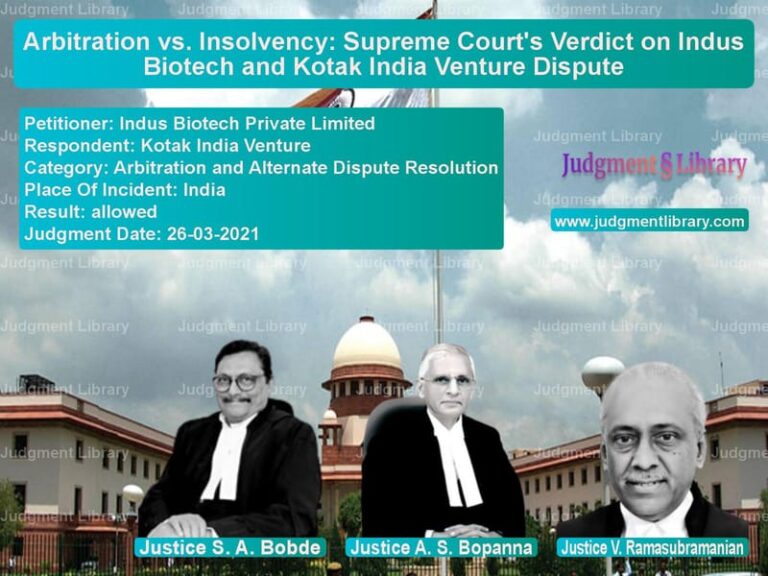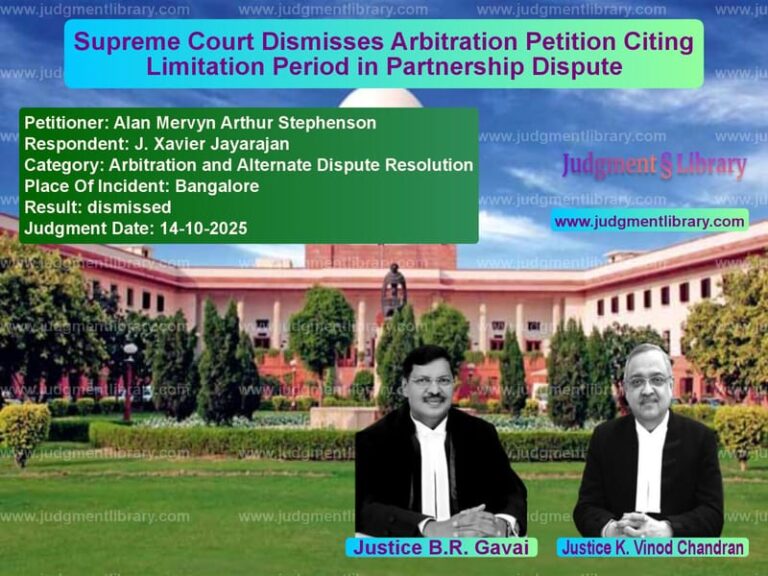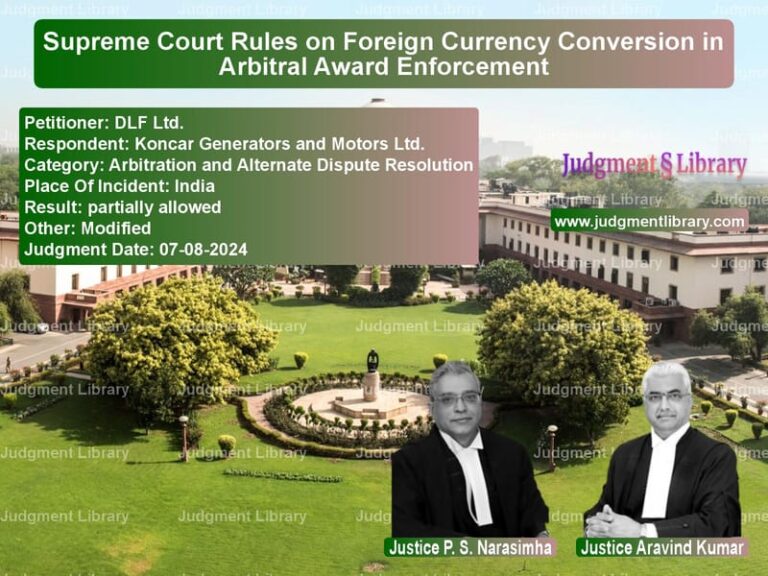Arbitration Award Enforcement: Supreme Court Upholds Validity in OPG, Gita Power vs. Enexio Dispute
The Supreme Court of India recently delivered a landmark judgment in the case of OPG, Gita Power vs. Enexio, addressing key legal principles related to the enforcement of arbitration awards. The dispute arose out of a commercial contract concerning the supply and installation of an Air Cooled Condenser (ACC) unit, which led to arbitration due to alleged breaches, delayed payments, and counterclaims.
The judgment highlights critical aspects of contract law, arbitration, and judicial intervention in arbitral awards. The ruling provides clarity on how courts should approach arbitral award enforcement, limitation periods, and counterclaims in commercial disputes.
Background of the Dispute
The case originated from agreements between OPG, Gita Power, and Enexio for the installation and commissioning of an ACC unit. The contractual terms stipulated that the project should be completed by March 31, 2014. However, disputes arose concerning delayed performance, liquidated damages, and customs duty liabilities.
Enexio initiated arbitration proceedings against OPG and Gita Power, claiming payment of outstanding dues. In response, OPG and Gita Power counterclaimed for damages and breach of contract, alleging that Enexio failed to meet its obligations under the agreement.
Legal Proceedings and Arguments
Petitioner’s (OPG and Gita Power) Arguments
- The arbitration claim by Enexio was barred by limitation as it was filed beyond the statutory period of three years.
- The Arbitral Tribunal erred in applying different limitation periods for the claims and counterclaims.
- The tribunal wrongly placed liability for customs duty on OPG and Gita Power despite contractual provisions suggesting otherwise.
- The Group of Companies doctrine was improperly applied to hold both OPG and Gita Power liable.
Respondent’s (Enexio) Arguments
- The claim was filed within the limitation period, considering contractual obligations extending beyond the original completion date.
- The counterclaims were time-barred as no proper acknowledgment of liability was made by Enexio.
- The tribunal correctly applied the Group of Companies doctrine, making both OPG and Gita Power jointly liable.
Key Issues Before the Supreme Court
The Supreme Court had to examine three major issues:
- Whether the arbitral claim by Enexio was time-barred.
- Whether the counterclaims filed by OPG and Gita Power were legally valid.
- Whether the arbitral award suffered from ‘patent illegality’ or violated public policy.
Supreme Court’s Observations
The Supreme Court extensively analyzed the arbitral tribunal’s findings and the arguments presented by both parties.
Justice Dhananjaya Y. Chandrachud, delivering the judgment, observed:
“The tribunal’s approach in determining limitation was consistent with contractual terms and applicable legal principles. The challenge against the arbitral award lacks substantial merit.”
The court further elaborated:
“An arbitral tribunal’s ruling on limitation must be respected unless it is demonstrably perverse. The tribunal correctly assessed that Enexio’s claim was within the permissible period based on contract terms.”
Judgment and Key Findings
- The Supreme Court ruled that the claim filed by Enexio was within the limitation period.
- Counterclaims made by OPG and Gita Power were correctly deemed time-barred due to the absence of any acknowledgment of liability.
- The arbitral award did not suffer from patent illegality and did not violate public policy.
- The appeal by OPG and Gita Power was dismissed, and the arbitral award was upheld.
Implications of the Judgment
This ruling establishes significant legal principles for arbitration in India:
- Respect for Arbitral Tribunal’s Findings: Courts should not interfere with well-reasoned arbitral awards unless there is clear perversity.
- Strict Limitation Rules: Parties must adhere to prescribed limitation periods, as courts will uphold tribunal decisions regarding timelines.
- Recognition of Group of Companies Doctrine: Holding associated entities jointly liable based on contract terms is legally permissible.
Conclusion
The Supreme Court’s decision in OPG, Gita Power vs. Enexio is a landmark judgment reaffirming the principles of commercial arbitration in India. By upholding the arbitral award and dismissing the challenge, the Court has reinforced the finality of arbitration and the need for strict adherence to limitation rules in contract disputes.
Read also: https://judgmentlibrary.com/supreme-court-directs-arbitration-in-cox-kings-vs-sap-india-dispute/
Petitioner Name: OPG and Gita Power.Respondent Name: Enexio.Judgment By: Justice Dhananjaya Y. Chandrachud, Justice J B Pardiwala, Justice Manoj Misra.Place Of Incident: India.Judgment Date: 20-09-2024.
Don’t miss out on the full details! Download the complete judgment in PDF format below and gain valuable insights instantly!
Download Judgment: opg-and-gita-power-vs-enexio-supreme-court-of-india-judgment-dated-20-09-2024.pdf
Directly Download Judgment: Directly download this Judgment
See all petitions in Arbitration Awards
See all petitions in Commercial Arbitration
See all petitions in Dispute Resolution Mechanisms
See all petitions in Enforcement of Awards
See all petitions in Arbitration Act
See all petitions in Judgment by Dhananjaya Y Chandrachud
See all petitions in Judgment by J.B. Pardiwala
See all petitions in Judgment by Manoj Misra
See all petitions in dismissed
See all petitions in supreme court of India judgments September 2024
See all petitions in 2024 judgments
See all posts in Arbitration and Alternate Dispute Resolution Category
See all allowed petitions in Arbitration and Alternate Dispute Resolution Category
See all Dismissed petitions in Arbitration and Alternate Dispute Resolution Category
See all partially allowed petitions in Arbitration and Alternate Dispute Resolution Category







